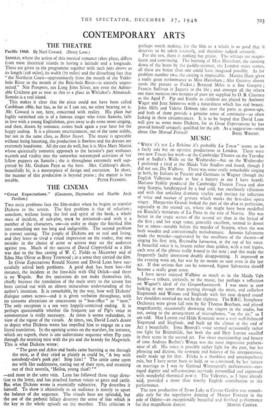MUSIC
"WHEN it's not La Boheme it's probably La Tosca" seems to be a fairly safe bet on operatic productions in London. There were two new Toscas last week—at the Cambridge Theatre on the Tuesday and at Sadler's Wells on the Wednesday—but on the Wednesday I preferred a rival at the Maida Vale Studios and heard, though I did not see, Die Walkitre. There was some really remarkable singing in both, by Italians in Puccini and Germans in Wagner (though the English Valkyries made as fine a battery as any I have heard). Mariano Stabile produced the Cambridge Theatre Tosca and also sang Scarpia, handicapped by a bad cold, but excellently villainous and with that unfailing dramatic vitality and instinct for inflection of voice and nuance of gesture which marks the first-class opera singer. Marguerita Grandi looked the part of the diva to perfection, especially in the second act, where she might have been modelled on Bianchi's miniature of La Pasta in the role of Norma. She was better in the tragic scenes of the second act than in the lyrical of the first ; and her stage sense, generally excellent, seemed to desert her at times--notably before the murder of Scarpia, when she was both wooden and conventionally melodramatic. Antonio Salvarezza made the mistake—aggravated by the smallness of the theatre—of singing his first aria, Recondita harmonia, at the top of his voice. A beautiful voice it is, brazen rather than golden, with a real legato, each note of the phrase really bound to the next ; and this made the frequently faulty intonation doubly disappointing. It improved as the evening went on, but was by no means so sure even in the last act. If that serious flaw can be removed, Signor Salvarezza should become a really great tenor.
I have never enjoyed Walkiire so much as in the Maida Vale Studio—a tribute, certainly, to the music, but perhaps a reflection on Wagner's ideal of the Gesamtkunstwerk. I was more at ease looking at my score than peering through the mists, and collarless Siegmunds and Wotans and Sieglinde with her coat draped round her shoulders worried me not In the slightest. The B.B.C. Symphony Orchestra were given full rein by Sir Thomas Beecham, and played magnificently, occasionally drowning the singers in the studio, but not, owing to the arrangement of microphones, " on the air," so I am told. Max Lorenz and Hilde Konetzni were a very well-balanced Siegmund and Sieglinde, and built up the climax at the end of Act r beautifully. Irma Bjoerck's voice seemed occasionally rather too light for Briinnhilde, but both she and Herr Lorenz excelled in their scene in the second act. For sheer musicianship and beauty of tone Andreas Boehm's Wotan was the most impressive perform- ance of all. His voice is possibly rather light for the part, but his phrasing and diction, the restraint and balance of his interpretation, easily made up for that. Fricka is a thankless and unsympathetic role, but I have never been so held, or so convinced, by her lecture on marriage as I was by Gertrud Wettergren's nerformance—out- raged dignity and self-conscious rectitude personified and expressed with wonderful rhetorical power. The Valkvries, as I have already said, provided a more than worthy English contribution to the performance.
The new production of Swan Lake at Covent Garden was remark- able only for the superlative dancing of Margot Fonteyn in the role of Odette—an exceptionally beautiful and finished performance






























 Previous page
Previous page